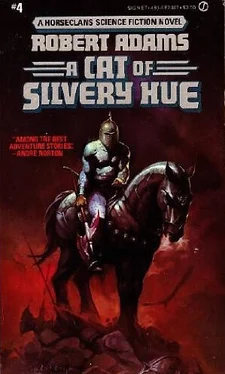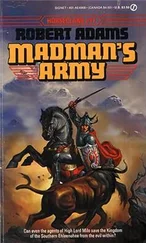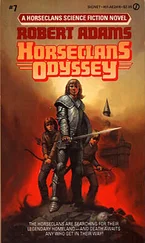At his father’s death—which many attested had been much hastened by Drehkos’ almost continual misconduct and profligacy—Hari, the elder by eighteen months, had returned to Morguhn to be confirmed in his komeesteheea. For his part, Drehkos had then been well content to accept the baronetcy which was the patrimony of a second son of his sept of Clan Daiviz and the very munificent maintenance income which the new komees generously and most unexpectedly offered to furnish his brother until he was well married or had otherwise made his fortune.
And Vahrohneeskos Drehkos had married well, financially speaking, though many had frowned upon his choice of a girl who was neither Kindred nor Ehleen. But there were few who said aught of their feelings in Drehkos’ hearing, for the sloe-eyed Rehbehkah had been the only living child of the most successful goldsmith—moneylender of the archducal city of Prahseenospolis—two hundred kaiee southeast of Morguhn—and the heiress-bride had brought to her new husband a vast fortune, so much in fact that not even twenty-five years of Drehkos’ debaucheries, harebrained business ventures and large contributions to the Ehleen Church or other questionable causes had forced him to lower his standard of living.
Rehbehkah Daiviz of Szohbuh had never presented Drehkos with a child, but he could not fault her for that lack, for neither (to the best of his knowledge) had any other of his multitudinous women. Though he never tried to conceal the fact that he had married her solely for her wealth, as she proved gentle, companionable, forgiving of his frequent excesses and an admirable chatelaine of his palatial Morguhnpolis townhouse, with the passing years, Drehkos came to truly love her … and, in the three years since her death from summer fever, he could not recall ever being really happy.
He had thought deeply about everything in the course of that ride from the rout below Morguhn Hall to Morguhnpolis, and had decided that his constant loneliness and longing for his dead wife was actually what had driven him into this sorry mess of a rebellion. Not religion, not envy, not hate, just simple, soul-deep loneliness.
Brother Hari had urged him to take another wife, either from within the Duchy of Morguhn or from beyond, had begged him close his empty, echoing townhouse and come to bide at Horse Hall, at least for a while. Dear old Hari—no man could ask a more loving brother or more generous friend. And, at that thought, Drehkos felt real regret that he had had even a small part in the slaying of the one person his older brother sincerely loved—Vaskos, the komees” illegitimate son.
As he led his heterogeneous band of Morguhnpolisee and Vawnee westward toward Bloody Ford and Raider Gap, he bade a silent and infinitely sorrowful farewell to the duchy of his birth, knowing that he would never again see its rolling leas, its verdant fields, or the Morguhnpolis house where he once had been so happy.
“Goodbye, dear brother Hari, please try to forgive me. Goodbye again, Rehbehkah, my own dear love, I’ll be with you soon.”
If Vahrohneeskos Drehkos Daiviz was repentant, his sister-in-law, Komeesah Hehrah Daiviz, was anything but. For days she raged whenever anything or anyone reminded her of her three youngest daughters. She had been so certain of their loyalty, so sure they would cleave always to the True Faith, into which they had been baptized and in which she had reared them, regardless of Komees Hari’s frequently loud and vociferous disapproval. Yet, when the time at last arrived, what did the three sisters—flesh of her flesh—do but betray her and everything which she believed in and had taught them? Not only had her recreant spawn given the bastard sufficient forewarning so he and his man were able to arm and fight their way out of the hall—killing four good Christian men in the process—but the shameless hussies had most certainly been responsible for jamming the closing mechanism of the main gate and had been waiting in the courtyard with saddled horses.
Even so, it had been a near thing, and the valiant warriors of the Faith might still have run them down or arrowed them, had not that whoreson’s retainer lingered within the entry passage, his presence unsuspected until he had treacherously cut down three more of her warriors. But God had favored His Cause with regard to that one pagan. The brave Danos had crept into the passage and driven an arrow into the heathen’s chest, then put another in his back when he tried to ride out. But the delay had been enough.
Hehrah could not imagine why three good, pious-seeming girls, who had not appeared at all attached to their Sun-worshiping sire for many years, would become so murderously disloyal, all of an instant. Why, why would Eeohabnah and Mehleesah and … and even little Behtee conspire to cost the lives of decent, God-fearing men with no higher motive than to prolong the unholy existence of a bantling half-brother? And the truly amazing fact was that he was almost a stranger to the girls, since even the eldest had seen him no more than two other times in her life.
The Bastard, which was all she ever called Keeleeohstos Vaskos, was a byblow of her husband’s youth and, consequently, of roughly her own age-though she always asserted him “old enough to be my father!” She had, since first her father had married her to Komees Hari and she had learned of her noble husband’s love for both the boy and the half-kindred peasant who had farrowed him, actively hated them both almost as much as she hated her coarse, barbaric heathen spouse. She had long relished the thought of seeing the Bastard dead—as dead as his pagan bitch of a mother, who, no doubt, had been frying these twenty-odd years in the deepest pit of Perdition. But his demise had not really obsessed her until his old fool of a father had announced his intention to have the Thirds Council legitimatize the object of her hatred, that he might be named and confirmed heir to the title and lands of Daiviz.
Since none of her boy children had survived infancy, she had long ago promised her eldest daughter, Djoodith, that title and lands and wealth would, upon the death of Komees Hari, go to the girl’s husband, Eeahgos of Mahrtospolis, second son of the komees of that city, a Kathahrohs or pure-blood Ehleen and, most important, a good Christian. She knew the Bastard to be as much a pagan as his horse-loving, Christ-hating father. To declare him legitimate and confirm him heir would be to dash her fondest hopes and dreams; it would mean that, barring a heaven-sent miracle, never would she live to see the lands and monies of Daiviz reaffirmed to the service of God and the True Faith—from which service they had been stolen by her husband’s barbarian forebears.
She had confided her hopes and her fears to her only peer then a member of the Thirds—dear, sweet Myros of Deskahti. It was thanks only to him and to the few other fine, upstanding men who clove still to the old loyalties that Komees Hari’s nefarious design had not been accomplished three years ago.
Because he knew of her fears of her husband and the Bastard, knew of her unparalleled devotion to the Faith, knew of her love for all things Ehleen and her deep and uncompromising contempt for the Kindred and all they represented, Myros had first approached her, dropped a few hints of the planned glories, then introduced her to the new kooreeos of Morguhn, the saintly Skiros.
She had become one of the very few women and the only noble woman who had been initiated into the Deeper Mysteries of the Faith, and, if she had been a zealous Christian previously, the witnessing of her first Holy Sacrifice made her a fanatic. The spurt of blood under the keen edge of the Holy Skiros’ knife, the dying screams of the pagan child whom he was sending to God, had fulfilled in her a longing which she had never before recognized.
Читать дальше












